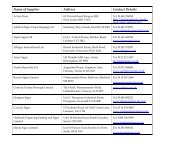titlepage/contents pg 1-16 - British Parking Association
titlepage/contents pg 1-16 - British Parking Association
titlepage/contents pg 1-16 - British Parking Association
You also want an ePaper? Increase the reach of your titles
YUMPU automatically turns print PDFs into web optimized ePapers that Google loves.
158 Chapter 10the freedom to use surpluses forany purpose.Revenue from fines (under 1984Act regulations) flow back intothe Government Exchequer.However, within a decriminalisedparking regime, the charges arenot a ‘fine’ nor are they a ‘levy’(as that implies fund raising) buta ‘charge’. The revenues fromthis charge are ring-fenced forparking, transport andenvironmental improvements.Government circulars make itclear that local authorities shouldavoid using parking charges as ameans of raising additionalrevenue or as a means of localtaxation.Certain authorities, particularly incentral London, generate verylarge surpluses in their parkingaccount because of the highcharges that are necessary bothto manage the parking demandand to provide a reasonable levelof enforcement. There is no legalproblem in this as the highcharges, and hence the highsurpluses, are justified by trafficand transport objectives ratherthan pure revenue generation. Inmany other parts of the UnitedKingdom, however, the positionis closer to ‘break even’.On-street spaces are broadlyconsidered as providing a publicservice where the primarypurpose should not be to make aprofit (and to which VAT does notapply) as opposed to off-streetspaces where legislation allowsa much less constrainedapproach (and to which VATdoes apply). The 1991legislation does notfundamentally change thatdistinction.The absence of a profit motivefor on-street parking charges isanother important reason forensuring that all costsassociated with the operation areincluded in the account,including commonly forgottenitems such as seniormanagement staff time and themaintenance of signs andmarkings.Off-street car parksAdequate costing should beallowed for maintenance andrepairs as well as direct runningcosts of car parks. It is the lackof an appropriate business planthat has led many authorities tounder-resource maintenanceand care to the point where carparks are a disgrace and nobodywants to use them.Too often“surpluses” have been declared(which may then be transferredto other council services), whenthe car parks are not cleanedproperly and maintenance isinsufficient.All off-street car parks requirefunds to operate and maintainthem. These costs will includethe business rates, lighting andpower, cleaning, maintenanceand supervision. The costs ofsupervision and enforcement forpay-on-foot or pay-at-exit willtend to merge, but for pay-anddisplayadditional enforcementcosts will be incurred. In mostcases these enforcement costswill be met from the excessparking or penalty payments thatwill be received.As well as looking after the assetvalue of the buildings, operatorsneed to consider whetherinvestment, such as improvedappearances, new ticketingmachines, CCTV and enhancedlighting, could actually pay forthemselves by increasing theattractiveness of the facility andtherefore its income generation.For private sector operatorscapital improvements can bejustified on simple assessmentsof rates of return, but for localauthorities it is frequently thecase that capital funding is notavailable – irrespective of themerits of the proposedinvestment. This highlights thepotential value of regardingparking as a business within thelocal authority framework, andthe potential value ofpartnerships with the privatesector to increase the capitalavailable for investment.







